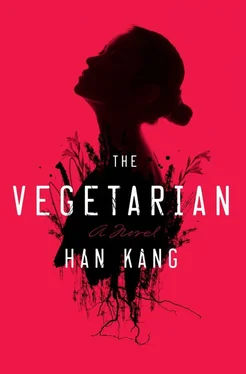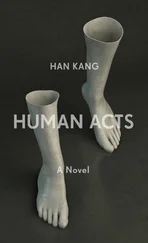A day or two after Ji-woo was born, when Yeong-hye came to the hospital to say hello to her first nephew, rather than congratulating her sister she had simply muttered to herself, “I’ve never seen such a tiny child…so this is what they’re like when they’ve just been born?”
There’d been something faintly unsettling about the quiet smile playing around Yeong-hye’s mouth. What seemed to be happening was that Yeong-hye was retreating from herself, becoming as distant to herself as she was to her sister. A forlorn face, behind a mask of composure. This was clearly nothing like the melancholy that sometimes afflicted her husband, and yet in certain respects they were both baffling to her in exactly the same way. They were both descending further into silence.
—
She enters the tunnel. It’s darker inside than usual, on account of the weather. She closes her umbrella and walks. She listens to the ringing echoes of her footsteps. A large speckled moth, a type she’s never seen before, flutters up off the surface of the wall, into a darkness saturated with damp. She pauses for a while, looks up at its beating wings. But on the pitch-black tunnel ceiling, the moth stays put, as though conscious of being observed.
Her husband liked to film flying things. Birds, butterflies, airplanes, moths, flies. These scenes of flight, which he always seemed to have inserted into a piece despite an apparent lack of connection to the overall subject, had confused her. She was a layperson when it came to art. Once, she’d asked him why he’d included a particular scene, a two-second clip of the black shadow of a bird soaring slowly up into the air, which he’d put after a scene of a ruined bridge and people crying at a funeral.
“Just because” had been his answer. “I just ended up putting it in. I put it in and I thought it looked good.”
And then that familiar silence.
Had she ever really understood her husband’s true nature, bound up as it was with that seemingly impenetrable silence? She’d thought, at one time, that it might be revealed in his work, in his video art. In fact, before she met him, she hadn’t even been aware that such a field of art existed. Despite her best efforts, though, his works proved incomprehensible to her. Nothing was revealed.
She remembers the late afternoon when they first met. He’d come into her shop, skinny as a sorghum stalk and with several days’ worth of stubble on his face, a camcorder bag slung over one shoulder that was clearly weighing him down. He searched out some shaving lotion, brought it to the counter and rested both arms on the glass, looking utterly worn out. He looked like he might collapse, and take the counter with him. It was faintly miraculous the way she, having had practically no romantic experiences up until then, came out with a friendly “Have you had lunch?” As if surprised, but lacking the energy required to express that surprise, he had merely fixed her face with his exhausted gaze. Something in his defenseless state had drawn her to him.
What she’d wanted, from that afternoon, had been to use her own strength to allow him to rest. But despite devoting herself wholeheartedly to this goal, even after they were married he still looked perpetually worn out. He was always busy with his own things, and during what little time he did spend at home he looked more like a traveler putting up there for a night than a man in his own home. His silence had the heavy mass of rock and the tenacious resistance of rubber, particularly when his art wasn’t going well.
It wasn’t long before she realized something: perhaps the one she’d so earnestly wanted to help was not him but herself. Was it not perhaps her own image — she who had left home at nineteen and gone on to make a life for herself in Seoul, always entirely under her own steam — that she had seen mirrored in this man’s exhaustion?
Just as she could not be certain of the source of her affection for him, or if he was really its true object, she had never been entirely sure of his feelings for her. He often seemed to rely on her, being the type for whom daily life was a constant struggle, full of potential pitfalls. He was honest to the point of seeming naive; exaggeration or flattery was entirely beyond him. But to her he was always kind, never once raised his voice in anger, and indeed would sometimes give her a look of great respect.
“I don’t deserve you,” he used to say, before they were married. “Your goodness, your stability, how calm you always are — the way you just get on with things, and make it look so easy…”
Respect — that was what she’d taken his words to connote, but might they not in fact have been intended as a confession, that whatever it was he felt for her, it was nothing even remotely resembling love?
Perhaps the only things he truly loved were his images — those he’d filmed, or then again, perhaps only those he had yet to film. The first time she went to one of his exhibitions, after they were married, she was taken aback; she couldn’t believe that this man, who had looked as though he might be about to collapse, had carted his camcorder around all these various places, with all the difficulties that must have involved. Indeed, it was hard for her even to imagine how he’d managed to negotiate to be allowed to film in sensitive places, the courage and sheer nerve he must at times have had to display, the patient perseverance that seemed so at odds with everything she knew about him. What it all came down to was that she just couldn’t believe he’d been sufficiently passionate about the project to put himself through all that.
There was one time that stuck in her memory. It had been a little after Ji-woo’s first birthday, when the boy was just beginning to walk. Her husband had used his camcorder to film Ji-woo tottering around the sunny living room. He’d filmed Ji-woo suddenly being scooped up into her arms, her lips pressed to the crown of the boy’s head.
“Every time Ji-woo takes another step,” he said, his eyes sparkling with life yet somehow inscrutable, “how about I make an animation so flowers spring up from his footsteps, like in that Hayao Miyazaki film? No, not flowers, butterflies would be better. Ah, in that case we should film it again, on a lawn.”
He showed her how to operate the camcorder, played back the scenes he’d just filmed, all while rattling on excitedly about his ideas for the piece.
“You and he’ll have to wear white clothes. No, wait, how about if the clothes were really shabby, old and worn? Yes, yes, of course, that’s it. A poor mother and child on an outing, the multicolored butterflies that fly up like a miracle every time the baby takes an unsteady step…”
But they didn’t have a lawn, plus Ji-woo soon grew out of the unsteady tottering phase. The video of butterflies flying up from the child’s footsteps never became a reality.
From a certain point onward he began to work himself even harder than before. He shut himself up in the studio, not even coming home in the evenings or at weekends, and yet he never seemed to have anything to show for it. He wandered the streets until his sneakers turned black. Sometimes, when she woke in the early hours and went into the bathroom, she was startled to find him there, curled up in the empty bathtub, still in his clothes, and sound asleep.
After her husband left them, Ji-woo would often ask her, “Is there a dad in our family?” It was the question he’d asked her every morning even when her husband was still around, so infrequently did the boy actually see him.
“No,” she would answer shortly. And then, soundlessly: “No one at all. There’s only you and me. That will have to be enough, now.”
—
In the rain, the hospital buildings stand dreary and forlorn. Their gray concrete walls appear darker and more solid than usual. The wards on the first and third floors have iron bars over the windows. Many of the patients liked to stick their faces between the bars; on bright days it was difficult to make them out, but with the weather like this several gray faces could be seen staring out at the rain. She glances up briefly, to the windows of Yeong-hye’s third-floor ward annex, then walks inside and heads toward reception.
Читать дальше












